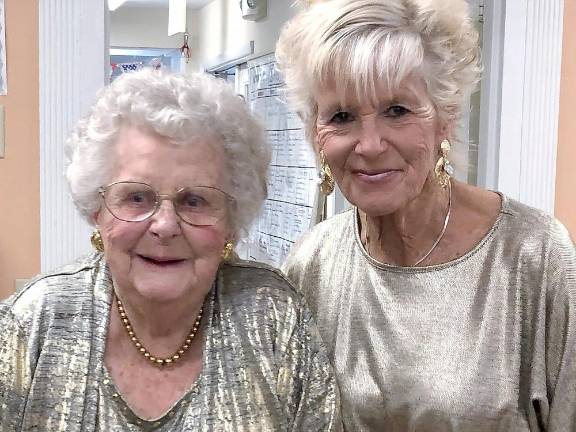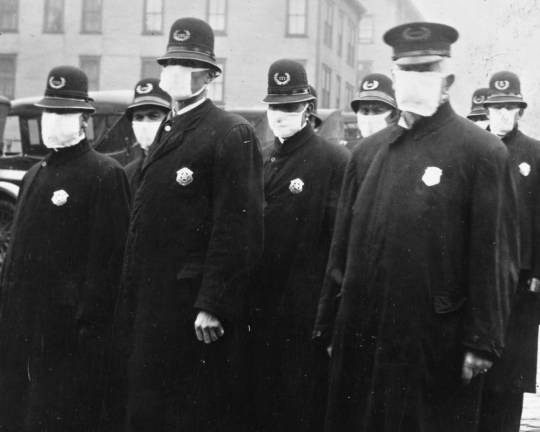Flossie Meyer shares what she’s learned in her 102 years
Sparta. Have patience! she counsels us all, from her deep well experience and love of life. We will look at the trials of the terrible year just past and say along with her, ‘We survived!’




Florence Meyer will be celebrating her 102nd birthday on Jan. 14. Through wars, the Great Depression, 9/11, times of social unrest, and two pandemics, she’s seen our country sorely tested, but stresses its resilience.
This Sparta resident has lived through it all. So in August, she wrote an essay of hope amid the pandemic titled “But We Survived!”
Above all, Meyer values patience. Remembering and analyzing the past help us cope with whatever challenges the future may bring. Change and the unexpected are inevitable. Acceptance and fortitude are essential.
“She has been a mover and a shaker all of her life,” said Marianne Dilworth, who worked with Sparta Township Recreation for 25 years with a concentration on senior citizens. “During that time I have met some very special people, and one who has remained very near and dear to my heart is Flossie, as she’s known to her friends.”
Meyer was born in 1919, during the the Spanish Flu epidemic. “During this time, my mother was pregnant with me,” she said. “The doctor told my father that either my mother or I would survive.”
Her mom lived to be 94. Meyer left that in the rearview mirror eight years ago.
“There was no National Institutes of Health nor a Centers for Disease Control,” she said. “The high fever that accompanied the flu was treated with aspirin and spirit of niter. There were no respirators or intensive care units.”
Social distancing, although not called that, was encouraged in 1919. Schools, churches and public gatherings were shut down. “There was a campaign against coughing and sneezing in public,” Meyer said.
One radio and the party line
The Great Depression of the 1930s followed. “Our country had 25 percent unemployment,” she said. “Many foods were rationed in order to prevent hording and also to prepare for war. Sugar, coffee, meat, fish, butter, eggs, rubber and gasoline had to be bought in small quantities with ration stamps. People sold apples on the street corners. Others came from door to door selling all kinds of household items.”
Living conditions were very different then. “There were no refrigerators, only ice boxes,” she said. “There were no washing machines or dishwashers. There was one bath room for the entire family. There was a small hot water take for our family of six. It meant we had a bath once a week.”
Families generally had one radio, and her family shared a telephone with four other families on the same “party line.”
“Those who were employed might own a car,” she said. “There were no school buses. We walked to and from school twice a day because we all came home for lunch. We never had a snow day. I was blessed that my father was a butcher. We were poor and lived in an apartment above the shop. However, there was always food to eat.“
They lived in Jersey City, and school summer vacation was for July and August. There were no camps or family excursions, rather, Meyer and her family relied on the city parks which had playgrounds and town swimming pools.
“We played neighborhood games like tag, hide and seek, hop scotch and jump rope,” she said. “On rainy days, we played Monopoly, checkers, Parcheesi and all sorts of card games. There was no such thing as television, computers or hand-held games.”
War, unrest, and terrorism
Meyer calls World War II a “terrible time for our country.”
“We heard about the attack at Pearl Harbor on the radio,” she recalled. “It was frozen in everyone’s mind.”
Many lives were disrupted. Many of those who served were wounded and died.
War came again in the 1960s, along with unrest.
“There were anti-war protests all over our country,” she said. “There were marches and riots. Those returning from Vietnam were disrespected. We had hope with both our president, John F. Kennedy, and the respected civil rights leader, Dr. Martin Luther King. However, our country experienced the loss of both through assassination.”
Meyer fast-forwards to 9/11.
“Almost 3,000 people died and over 25,000 injured. It was a terrible act of hate. However, as awful as it was, there were many examples of heroism from first responders. People gave their lives to save others. Our country pulled together in a special way.”
‘Mysterious’ COVID-19
Just after Meyer turned 101, another momentous even hit our nation and the world. She’d already witnessed one pandemic, but this one she deemed “mysterious.”
“We are learning more each day, but we still do not have answers,” she said in August. “Our country has never experienced anything like these past few months. There are so many sick and so many deaths. Our hospitals are experiencing shortages and overcrowding. Our health workers are exhausted. We all have been in quarantine, people working at home, experiencing social distancing and wearing masks. Many social events, religious gatherings and travel have been canceled. Sports are in a turmoil. Parents, teachers and administrators are in a quandary as to what is best for our children. We have so many questions and fears.”
“Will we survive?” Meyer asks before answering her own question, as she has so many times before: “Yes!”
“I see the good in people and the glass always as full,” she said. “I have been called a ‘Pollyanna’ and an optimist. Let us try to think of us all as Americans. No red or blue states but all of us the color of our flag: red, white and blue. All of us believing. ‘One nation under God, indivisible with liberty and justice for all.’ I do believe God has and will continue to provide. We may not have all he answers now, but He does. We will survive.”
’The worst thing’
She married Harry Meyer on Dec. 12, 1940. They had three children. The eldest, Bruce, died of colon cancer in 2017.
“The worst thing in the world is to lose a child,” Meyer said. “He was sick for a year before he died.”
She also has a daughter, Jane, and son, Robert, as well as five grandchildren and six great-grandsons.
It was because of her children that she moved to Sparta after her husband died in 1979. She moved to Knoll Heights Village in 1984, and for the past three years she’s been at Knoll Heights. She calls her years at both places “wonderful.” Meyer volunteered at Newton Memorial Hospital Auxiliary’s Beehive thrift shop for 25 years and also spent a lot of time volunteering at Sparta Presbyterian Church. She was glad to drive seniors to doctor’s appointments.
Meyer loves doing crossword puzzles and word games and playing Scrabble. Her absolute favorite pastime is bridge, but no one currently in her building plays it. Her favorite musical is “The Sound of Music.” As to her longevity, she credits eating a lot of fruits and vegetables and eating foods that are made from scratch.
“No chemicals or additives or anything,” she said “One hundred and two. I can’t believe I’m getting that old. I don’t feel that old. God’s been very good to me, and I think that’s why I’m still here.”
Biggest regret
Meyer said her biggest regret was not finishing high school with her graduating class. Because of the size of her high school class, they only went to school for half a day, but not graduating with them was because of something else.
“I played hooky a lot,” she said. “I did graduate after five-and-a-years later.”
Five months after she wrote “But We Survived!,” COVID-19 vaccines are being administered.
“I think the vaccine is great, and I can’t wait to get mine,” she said. “People said it took a long time to get a vaccine, but it’s really not a long time because it’s very important to do it right. These things can’t be done in a hurry.”
That sentiment leads into her advice to younger generations. Meyer reflects, with resignation, that one can not change the things that have already happened. But one can have hope for the future.
“I feel the younger generations had a disadvantage because they have been given so much,” she said. “They have no tolerance. The biggest thing in this world is to have patience. Things happen and when they do, you need patience. We need to accept change and accept God.”
Happy 102nd birthday, Flossie.